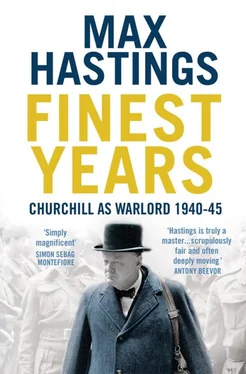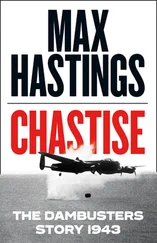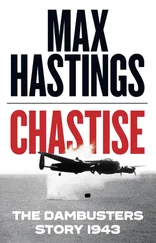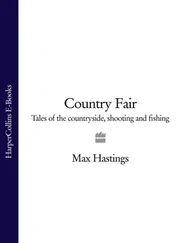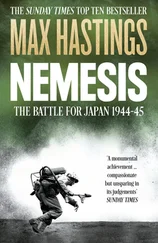1 ...6 7 8 10 11 12 ...18 On the 20th he told the chiefs of staff that the time had come to consider whether residual Norwegian operations around Narvik should be sustained, when troops and ships were urgently needed elsewhere. On the Continent, the Germans were driving south and west so fast that it seemed doubtful whether the BEF could regain touch with the main French armies. Gort was still striving to pull back forces from the Scheldt. That night, German units passed Amiens on the hot, dusty road to Abbeville, cutting off the BEF from its supply bases. Still Churchill declined to despair. He told the war cabinet late on the morning of the 21st that ‘the situation was more favourable than certain of the more obvious symptoms would indicate’. In the north, the British still had local superiority of numbers. Fears focused on the perceived pusillanimity of the French, both politicians and soldiers. That day, a British armoured thrust south from Arras failed to break through. The BEF was isolated, along with elements of the French First Army. Calais and Boulogne remained in British hands, but inaccessible by land.
The House of Commons on 20 May, with the kind of inspired madness that contributed to the legend of 1940, debated a Colonial Welfare Bill. Many people in Britain lacked understanding of the full horror of the Allies’ predicament. Newspaper readers continued to receive encouraging tidings. The Evening News headlined on 17 May: ‘BRITISH TROOPS SUCCESS’. On the 19th, the Sunday Dispatch headline read ‘ATTACKS LESS POWERFUL’. Even two days later, the Evening News front page proclaimed ‘ENEMY ATTACKS BEATEN OFF’. An editorial in the New Statesman urged that ‘the government should at once grapple with the minor, but important problem of Anglo-Mexican relations’.
Gort’s chief of staff, Lt.Gen. Henry Pownall, complained bitterly on 20 May about the absence of clear instructions from London: ‘Nobody minds going down fighting, but the long and many days of indigence and recently the entire lack of higher direction…have been terribly wearing on the nerves of all of us.’ But when orders did come from the prime minister three days later—for a counterattack south-eastwards by the entire BEF—Pownall was even angrier: ‘Can nobody prevent him trying to conduct operations himself as a super Commander-in-Chief ? How does he think we are to collect eight divisions and attack as he suggests? Have we no front to hold? He can have no conception of our situation and condition…The man’s mad.’
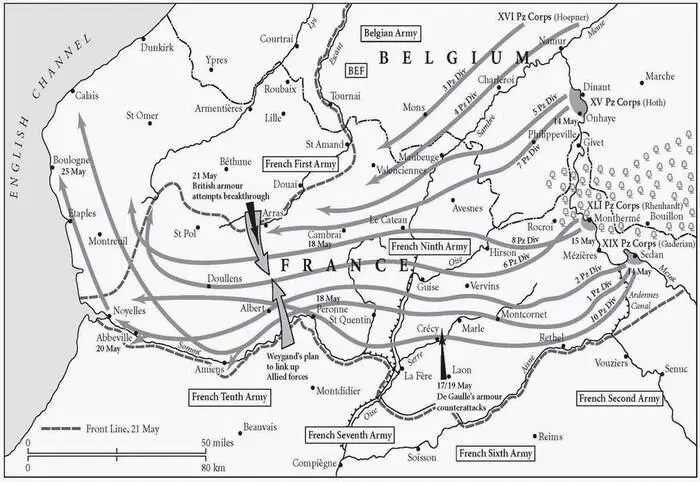
Only the port of Dunkirk still offered an avenue of escape from the Continent, and escape now seemed the BEF’s highest credible aspiration. On the 22nd and 23rd, the British awaited tidings of the promised French counter-offensive north-eastward, towards Gort. Gen. Maxime Weygand, who had supplanted the sacked Gamelin as Allied supreme commander, declared this to be in progress. In the absence of visible movement Churchill remained sceptical. If Weygand’s thrust failed, evacuation would become the only British option. Churchill reported as much to the King on the night of 23 May, as Boulogne was evacuated. On the night of the 24th he fumed to Ismay about Gort’s failure to launch a force towards Calais to link up with its garrison, and demanded how men and guns could be better used. He concluded, in the first overtly bitter and histrionic words which he had deployed against Britain’s soldiers since the campaign began: ‘Of course, if one side fights and the other does not, the war is apt to become somewhat unequal.’ Ironside, the CIGS, told the Defence Committee that evening that if the BEF was indeed evacuated by sea from France, a large proportion of its men might be lost.
Churchill was now preoccupied with three issues: rescue of Gort’s men from Dunkirk; deployment of further units of the British Army to renew the battle in France following the BEF’s withdrawal; and defence of the home island against invasion. Reynaud dispatched a bitter message to London on the 24th, denouncing the British retreat to the sea and blaming this for the failure of Weygand’s counter-offensive—which in truth had never taken place. ‘Everything is complete confusion,’ Sir Alexander Cadogan, Permanent Under-Secretary at the Foreign Office, noted in his diary on the 25th, ‘no communications and no one knows what’s going on, except that everything’s black as black.’
Churchill cabled to the Dominion prime ministers, warning that an invasion of Britain might be imminent. He rejoiced that reinforcements from the Empire were on their way, and asserted his confidence that the Royal Navy and RAF should be able to frustrate an assault, following which ‘our land defence will deal with any sea-borne survivors after some rough work’. He rejected the notion of a public appeal to the United States. He feared, surely correctly, that such a message would have scant appeal to a nation already disposed to dismiss aid to Britain as wasted motion. In this, as in his judgement of shifting American moods through the months that followed, he displayed much wisdom. A Gallup poll showed Americans still overwhelmingly opposed, by thirteen to one, to participation in the European conflict.
On 25 May, Churchill dispatched a personal message to Brigadier Claude Nicholson, commanding the British force in Calais, ordering that his men must fight to the end. The Belgians were collapsing. Gort cancelled his last planned counter-attack southward, instead sending north the two divisions earmarked for it, to plug the gap between British and Belgian forces. That evening, at a meeting of the Defence Committee, Churchill accepted the conclusion which Gort, now out of contact with London, had already reached and begun to act upon. The BEF must withdraw to the coast for evacuation. The commander-in-chief’s order, issued in advance of consent from Britain, represented his most notable contribution to the campaign, and by no means a negligible one. The prime minister ordered that six skeleton divisions in Britain should be urgently prepared for active service, though scant means existed to accomplish this. Artillery, anti-tank weapons, transport, even small arms were lacking. He acknowledged that France’s leaders, resigned to defeat, would probably depose Reynaud and make terms with Hitler. Henceforward, the future of the French fleet was much in his mind. In German hands, these warships might drastically improve the odds favouring a successful invasion of Britain. That night, Ironside resigned as CIGS, to become commander-in-chief home forces. The general had never commanded Churchill’s confidence, while Sir John Dill, Ironside’s vice-chief, did. Next day Dill, fifty-nine years old, clever and sensitive though seldom in good health, became head of the British Army.
At 9 o’clock on the morning of the 26th, Churchill told the war cabinet there was a good chance of ‘getting off a considerable proportion of the British Expeditionary Force’. Paul Reynaud arrived in London. He warned the prime minister over lunch that if Germany occupied a large part of France, the nation’s old hero Marshal Philippe Pétain would probably call for an armistice. Reynaud dismissed British fears that the Germans were bent on an immediate invasion of their island. Hitler would strike for Paris, he said, and of course he was right. Churchill told Reynaud that Britain would fight on, whatever transpired. Following a break while he met the war cabinet, the two leaders resumed their talks. Churchill pressed for Weygand to issue an order for the BEF to fall back on the coast. This was designed to frustrate charges of British betrayal. Reynaud duly requested such a message, to endorse the reality of what was already taking place.
Читать дальше
